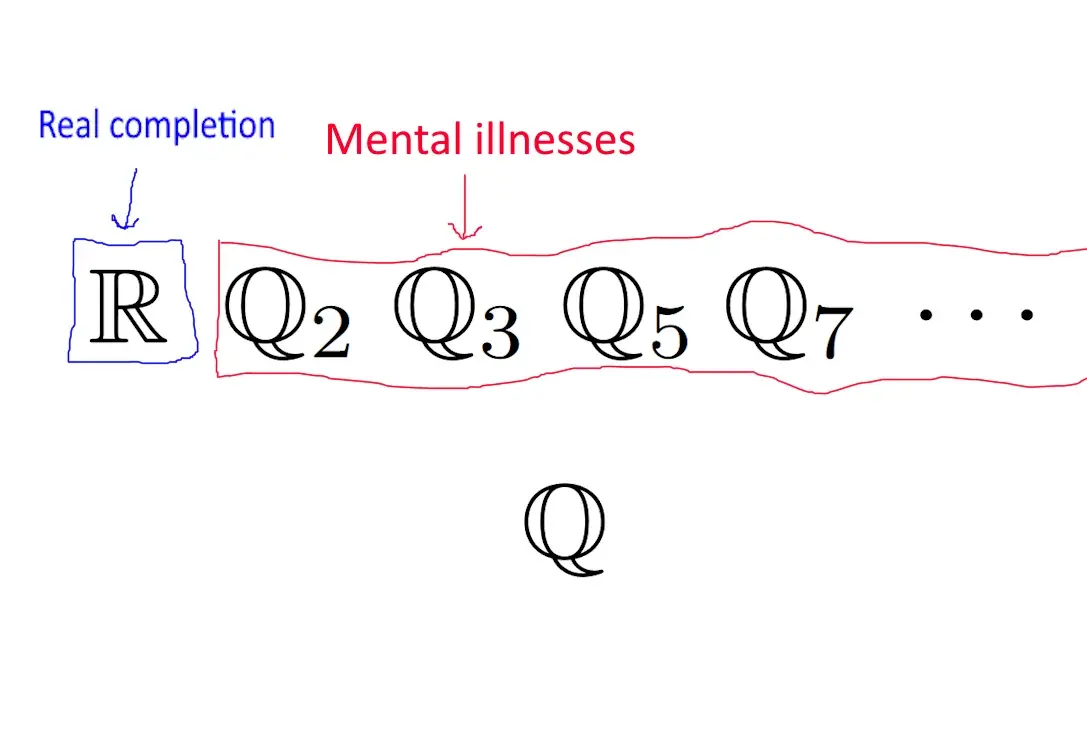Where is i? Is it safe? Is it alright?
deleted by creator
Please stop talking about your imaginary girlfriend, it’s embarrassing honestly.
It seems in your equations, you conjugated it.
i goes to another school. You wouldn’t know her.
Nope, you fell for the classic sibling blunder:
What about INFINITY PLUS ONE!?
It’s Infinity! Infinity -1? also infinity! Well what about infinity times infinity? Believe it or not, infinity! ♾️
Infinity gangsta when aleph null walks in
assuming the interval includes all of the real numbers, then it is definitely larger than aleph null (the size of all countable infinities)
What about infinity times zero?
For that one we’re going to call my good friend L’Hôpital. That guy rules!
Oh yeah? What’s infinity divided by zero?
Last time I saw this kind of challenge it was on reddit and I just replied with ℝ, but people brought up that this leaves out complex numbers. I’ll now contend, however, that any number not included in that isn’t real.
You could use ℂ
Quaternions hello?
What about quaternions and octonions and …
x
deleted by creator
That leaves out quaternions

This image goes so hard
Just like birds, complex numbers aren’t real!
Screw you sqrt(-1), you aren’t even a real number, you poser!
Complex numbers? That sounds imaginary.
Removed by mod
I cast set theory?
I was thinking the same thing.
Thanks.
Aren’t there numbers past (plus/minus) infinity? Last I hear there’s some omega stuff (for denoting numbers “past infinity”) and it’s not even the usual alpha-beta-omega flavour.
Come to think of it, is there even a notation for “the last possible number” in math? aka something that you just can’t tack “+1” at the end of to make a new number?
What you’re probably thinking of is Ordinal numbers.
As for your second question, I don’t think any “last number” could exist unless we explicitly declared one. And even then… I’m not sure what utility there would be in declaring a “last number”.
I mean, whoever gets to declare a “last number” that works certainly will get some bragging rights. After all, you can only ever declare one.
…Right?
(I know math is very weird)
Which of the infinities? There are many, many :D
The smallest infinity is the size of the natural numbers. That infinty, Aleph zero, is smaller than the infinity of the real numbers, Aleph one. “etc.”
Which of the infinities? There are many, many :D
Oh no! Please don’t tell me there are infinity infinities!
Unfortunately yes there are and it’s a very big infinity of infinties…
Oh wow and here I was hoping…
…actually, I don’t know what, but I was hoping.
Wait, they ran out of greek letters and started using Hebrew ones now? When did that happen?
I can’t wait to see how much is the number Gimel
No matter what Wikipedia says, Aleph Null is the real way to say it, because it sounds so much cooler
I agree. But I’m Danish, where zero is called nul and and Ø is in the alphabet, so I try to cool ot a bit with the coolness.
There is nothing “past” infinity, infinity is more a concept than a number, there are however many different kinds of infinity. And for the record, infinity + 1 = infinity, those are completely equal. Infinity + infinity = infinity x 2 = still the same kind of infinity. Infinity times infinity is debatably a different kind of infinity but there are fairly simple ways of showing it can be counted the same.
Essentially the number of numbers between 1 and 2 is the same as the number of numbers between 0 and infinity. They are still infinite.
Hi, I’m a mathematician. My specialty is Algebra, and my research includes work with transfinites. While it’s commonly said that infinity “isn’t a number” I tend to disagree with this, since it often limits how people think about it. Furthermore, I always find it odd when people offer up alternatives to what infinity is; are numbers never concepts?
Regardless, here’s the thing you’re actually concretely wrong about: there are provably things bigger than infinity, and they are all bigger infinities. Furthermore, there are multiple kinds of transfinite algebra. Cardinal algebra behaves mostly like how you described, except every transfinite cardinal has a successor (e.g. There are countably many natural numbers and uncountably many complex numbers). Ordinal algebra, on the other hand, works very differently: if ω is the ordinal that corresponds to countable infinity, then ω+1>ω.
You have the spirit of things right, but the details are far more interesting than you might expect.
For example, there are numbers past infinity. The best way (imo) to interpret the symbol ∞ is as the gap in the surreal numbers that separates all infinite surreal numbers from all finite surreal numbers. If we use this definition of ∞, then there are numbers greater than ∞. For example, every infinite surreal number is greater than ∞ by the definition of ∞. Furthermore, ω > ∞, where ω is the first infinite ordinal number. This ordering is derived from the embedding of the ordinal numbers within the surreal numbers.
Additionally, as a classical ordinal number, ω doesn’t behave the way you’d expect it to. For example, we have that 1+ω=ω, but ω+1>ω. This of course implies that 1+ω≠ω+1, which isn’t how finite numbers behave, but it isn’t a contradiction - it’s an observation that addition of classical ordinals isn’t always commutative. It can be made commutative by redefining the sum of two ordinals, a and b, to be the max of a+b and b+a. This definition is required to produce the embedding of the ordinals in the surreal numbers mentioned above (there is a similar adjustment to the definition of ordinal multiplication that is also required).
Note that infinite cardinal numbers do behave the way you expect. The smallest infinite cardinal number, ℵ₀, has the property that ℵ₀+1=ℵ₀=1+ℵ₀. For completeness sake, returning to the realm of surreal numbers, addition behaves differently than both the cardinal numbers and the ordinal numbers. As a surreal number, we have ω+1=1+ω>ω, which is the familiar way that finite numbers behave.
What’s interesting about the convention of using ∞ to represent the gap between finite and infinite surreal numbers is that it renders expressions like ∞+1, 2∞, and ∞² completely meaningless as ∞ isn’t itself a surreal number - it’s a gap. I think this is a good convention since we have seen that the meaning of an addition involving infinite numbers depends on what type of infinity is under consideration. It also lends truth to the statement, “∞ is not a number - it is a concept,” while simultaneously allowing us to make true expressions involving ∞ such as ω>∞. Lastly, it also meshes well with the standard notation of taking limits at infinity.
Is infinity to the power of infinity special?
IIRC Depends if you talk about cardinal or ordinal numbers. What I remember: In cardinal numbers (the normal numbers we think of, which denote quantity, etc.) have their maximum in infinity. But in ordinal numbers (which denote order - first, second, etc.) Can go past infinity - the first after infinity is omega. Then omega +1. And then some bigger stuff, which I don’t remember much, like aleph 0 and more.
No cardinal and ordinal numbers continue past the “first” infinity in modern math. I.e. The cardinal number denoting the cardinality of the natural numbers (aleph_0) is smaller than the one of the reals.
Edit: In modern systems aleph_0 = omega btw. Omega denotes ordinal and aleph denotes cardinals.
So wait, you can’t have numbers larger than infinity, but you can order them “past infinity”? I’m trying to wrap my head around the concept, and the clearest thing I can get at the moment is that the "infinity+1"th number is infinity… would that be right?
No you can have numbers past infinity op is wrong.
As for how to order past the first infinity it’s easy.
Of course first you have 1 < 2 < 3 < 4 < … Then you take a new number not equal to any of the others let’s call it omega. Define omega to be larger than the others. So 1 < omega, 2 < omega,…
This you can of course continue even further by introducing omega + 1 which is larger than omega and therefore larger than all natural numbers.
You can continue this even further by introducing a new number let’s call it lambda that is bigger than all omega + x where x is a natural number.
This can be continued forever i.e. an infinite amount of times.
Edit: that is meant by ordinal number as you define a unique order each step.
The problem is that the concept of cardinality and ordinality is the same in the finite case. That is numbers that tell you how many things there are can also be used to sort them.
This does not work past the first infinity. If you add omega to the natural numbers then the amount of numbers you have is still the first infinity.
But there are bigger cardinal infinities than the first one. For example the cardinality of the real numbers. I.e. There are more real numbers than natural numbers.
Hi! I’m a mathematician, and if you want to know more about infinity, I recommend this video: https://youtu.be/23I5GS4JiDg
After reading how this thread is going I’m half expecting this to be a Kurzgesagt video or something equally “cutesy existential dread” inducing lol. Let’s see what do I find!
There is nothing past infinity on the real number line. Then there is the imaginary line that gives you an infinity for the complex numbers
Doesn’t include “i”
i isn’t a real number, you imagined it
From gatekeeping to gaslighting in 2 comments. Not bad!
What a girlboss
not a real number
Oh you like math? Name all the sets of sets that don’t include themselves.
Russell is that you? Please stop breaking my formal systems
Here’s a thousand page proof defining all the logical underpinning required to prove that 1 + 1 = 2.
Sad Frege noises
0,1,2,3,4,5,6,7,8,9
[0-9]*\.?[0-9]*edit: ok no empty strings
[0-9]+\.?[0-9]*That regex implies “” is a number
If I had a nickel for every time that happened I’d have “” nickels.
I didn’t realize ‘.’ is a number.
\([0-9]+\.[0-9]\)?[0-9]*is more accurate I think.I don’t quite understand yours, why does it need parentheses? And requires the decimal point?
how about
[0-9]+\.?[0-9]*The parens in my regex group part of the regex, so the following ‘?’ makes the entire group optional.
Your regex matches (for example) ‘5.’ as a number.
Mine is also slightly wrong, it matches a blank string as a number. Here’s a better one:
[0-9]+\(\.[0-9]+\)?Your regex matches (for example) ‘5.’ as a number
Yeah that’s on purpose. That’s often used in sciences to mark significant digits.
The thing I’m confused by in yours is you’re escaping the parenthesis, so there need to be literal parenthesis in the matching number, or that’s what it showed in the regex checker.
Whether or not you need to escape parens depends on the regex implementation.
yeah but by Cantor’s diagonal argument, you still wouldn’t be listing all the real numbers
well sure, if you want to be fancy. i was speaking in layman terms for the rest of the world.
regex for the win.
What about imaginary numbers?
[0-9]+\.?[0-9]*[ij]?I’m not making one for mixed numbers
deleted by creator
I thought it was ‘R’, for the set of all real numbers.
Oh, so complex numbers are not numbers now?!
You also have to remember to put the +C at the end
U
Ω
UΩU
UωU
Pi
*
i
m
g
a
y
Fred.
(∀x:Number(x)=T)(Name(x)=“Fred”)
I name every number Fred.


















